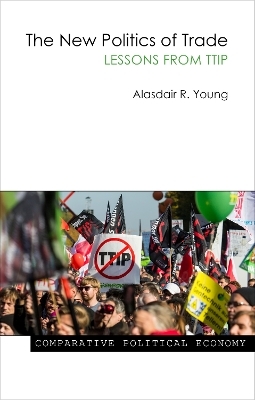
The New Politics of Trade
Lessons from TTIP
Seiten
2017
Agenda Publishing (Verlag)
978-1-911116-74-5 (ISBN)
Agenda Publishing (Verlag)
978-1-911116-74-5 (ISBN)
- Lieferbar (Termin unbekannt)
- Versandkostenfrei
- Auch auf Rechnung
- Artikel merken
A penetrating analysis of the complexities of the TTIP negotiations, which explores why they proved so difficult to conclude, what motivated the different parties concerned and what implications there have been for future trade deals, especially for the UK in its post-Brexit negotiations.
The negotiation of international trade agreements has become the issue of the moment. With Brexit, a change in administration in the United States, a fragile economic recovery in the Eurozone and China facing a slowdown in its growth, nothing is more critical to the future global economy than the terms of trade between its largest economic blocs. The Transatlantic Trade and Investment Partnership (TTIP) is Europe's most controversial trade agreement ever. Aimed at reducing regulatory barriers between the United States and the EU, it was expected to be fairly straightforward given strong business support on both sides of the Atlantic. It has not been so. The negotiations have dragged on far longer than anticipated and now look set to fail altogether. Yet the process of its negotiation, the terms of the potential agreement and its sticking points provide valuable lessons for policy-makers and academics tasked to bring future trade deals and arrangements to successful conclusions.
Alasdair Young offers a penetrating analysis of the complexities of the TTIP negotiations and explores why they have proved so difficult to conclude, what motivates the different parties concerned and what implications there are for politics and policy. Young throws light on the limits of the transatlantic cooperation and the processes of globalization and teases out the implications for the UK in its post-Brexit trade negotiations and for other nations now facing a more protectionist stance from the United States.
The negotiation of international trade agreements has become the issue of the moment. With Brexit, a change in administration in the United States, a fragile economic recovery in the Eurozone and China facing a slowdown in its growth, nothing is more critical to the future global economy than the terms of trade between its largest economic blocs. The Transatlantic Trade and Investment Partnership (TTIP) is Europe's most controversial trade agreement ever. Aimed at reducing regulatory barriers between the United States and the EU, it was expected to be fairly straightforward given strong business support on both sides of the Atlantic. It has not been so. The negotiations have dragged on far longer than anticipated and now look set to fail altogether. Yet the process of its negotiation, the terms of the potential agreement and its sticking points provide valuable lessons for policy-makers and academics tasked to bring future trade deals and arrangements to successful conclusions.
Alasdair Young offers a penetrating analysis of the complexities of the TTIP negotiations and explores why they have proved so difficult to conclude, what motivates the different parties concerned and what implications there are for politics and policy. Young throws light on the limits of the transatlantic cooperation and the processes of globalization and teases out the implications for the UK in its post-Brexit trade negotiations and for other nations now facing a more protectionist stance from the United States.
Alasdair R. Young is Professor of International Affairs and Co-Director of the Center for European and Transatlantic Studies at the Georgia Institute of Technology. His books include Parochial Global Europe: Twenty-First Century Trade Politics (with John Peterson) (2014).
Foreword by Erik Jones1. Misplaced optimism2. The transatlantic economy: interpenetrated not integrated
3. TTIP’s ambition in context
4. Cooperation: Transatlantic business alliances
5. Contestation: The politicization of trade policy
6. Herding cats: Intra- and inter-governmental coordination
7. Brexit and Trump: Body blows to TTIP
8. Lessons from TTIP
| Erscheinungsdatum | 01.02.2018 |
|---|---|
| Reihe/Serie | Comparative Political Economy |
| Verlagsort | Newcastle upon Tyne |
| Sprache | englisch |
| Maße | 138 x 216 mm |
| Themenwelt | Recht / Steuern ► EU / Internationales Recht |
| Wirtschaft ► Volkswirtschaftslehre ► Makroökonomie | |
| Wirtschaft ► Volkswirtschaftslehre ► Wirtschaftspolitik | |
| ISBN-10 | 1-911116-74-6 / 1911116746 |
| ISBN-13 | 978-1-911116-74-5 / 9781911116745 |
| Zustand | Neuware |
| Haben Sie eine Frage zum Produkt? |
Mehr entdecken
aus dem Bereich
aus dem Bereich
Volkswirtschaftslehre für eine sich ändernde Welt
Buch | Hardcover (2024)
De Gruyter Oldenbourg (Verlag)
CHF 62,90
Kompakt und prüfungsrelevant für Wirtschaftswissenschaftler
Buch | Softcover (2021)
Vahlen, Franz (Verlag)
CHF 16,65
Makroökonomie, Wirtschaftspolitik und nachhaltige Entwicklung
Buch | Hardcover (2022)
Vahlen (Verlag)
CHF 69,70


